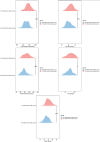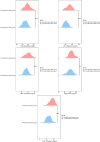The relationship between the severity and complications of Henöch-Schönlein purpura in children and dietary inflammatory index: a retrospective cohort study
- PMID: 39346080
- PMCID: PMC11430262
- DOI: 10.7717/peerj.18175
The relationship between the severity and complications of Henöch-Schönlein purpura in children and dietary inflammatory index: a retrospective cohort study
Abstract
Purpose: To investigate the association between the Dietary Inflammatory Index (DII) and disease severity as well as complications in children diagnosed with Henöch-Schönlein purpura (HSP), shedding light on the potential influence of dietary factors on HSP.
Methods: A retrospective cohort study was conducted, enrolling children aged 2-14 years diagnosed with HSP. Participants were divided into low and Pro-inflammatory dietary groups based on their DII scores. Biomarkers, nutrient intake, blood lipid profiles and disease complications were compared between the two groups. Spearman correlation analysis was performed to assess the relationship between DII and complications.
Results: A total of 115 patients, including 56 patients with anti-inflammatory dietary and 59 with pro-inflammatory dietary, were included. The pro-inflammatory dietary group demonstrated significantly elevated of C-reactive protein, tumor necrosis factor-α, interleukin-6, erythrocyte sedimentation rate, white blood cell count, eosinophils, IgE, consumption of total calories, protein, carbohydrates, fiber, fat intake, total cholesterol, LDL cholesterol, HDL cholesterol, triglycerides, VLDL cholesterol, complications of renal, skin, gastrointestinal, coagulation and respiratory in comparison to the anti-inflammatory dietary group. DII was positively correlated with renal, skin, gastrointestinal, coagulation and respiratory complications.
Conclusion: The study highlights the potential influence of dietary inflammatory potential, as quantified by the DII, on disease severity and complications in children with HSP. Understanding the interplay between dietary patterns and inflammatory responses in pediatric vasculitis has implications for the management of HSP, emphasizing the relevance of considering dietary interventions to optimize clinical outcomes and improve the overall well-being of affected children.
Keywords: Children; Complication; Correlation analysis; Dietary inflammatory index; Henöch-Schönlein purpura; Severity.
© 2024 Chen et al.
Conflict of interest statement
The authors declare that they have no competing interests.
Figures
References
-
- Andreazza AC, Laksono I, Fernandes BS, Toben C, Lewczuk P, Riederer P, Kennedy SH, Kapogiannis D, Thibaut F, Gerlach M, Gallo C, Kim YK, Grünblatt E, Yatham L, Berk M, Baune BT. Guidelines for the standardized collection of blood-based biomarkers in psychiatry: steps for laboratory validity—a consensus of the Biomarkers Task Force from the WFSBP. The World Journal of Biological Psychiatry. 2019;20(5):340–351. doi: 10.1080/15622975.2019.1574024. - DOI - PMC - PubMed
-
- de Freitas NPA, Carvalho TR, Gonçalves C, da Silva PHA, de Melo Romão LG, Kwak-Kim J, Cavalcante MB. The dietary inflammatory index as a predictor of pregnancy outcomes: systematic review and meta-analysis. Journal of Reproductive Immunology. 2022;152(Suppl 3):103651. doi: 10.1016/j.jri.2022.103651. - DOI - PubMed
-
- de Mello RN, de Gois BP, Kravchychyn ACP, Dâmaso AR, Horst MA, Lima GC, Corgosinho FC. Dietary inflammatory index and its relation to the pathophysiological aspects of obesity: a narrative review. Archives of Endocrinology and Metabolism. 2023;67(6):e000631. doi: 10.20945/2359-3997000000631. - DOI - PMC - PubMed
MeSH terms
Substances
LinkOut - more resources
Full Text Sources
Research Materials



